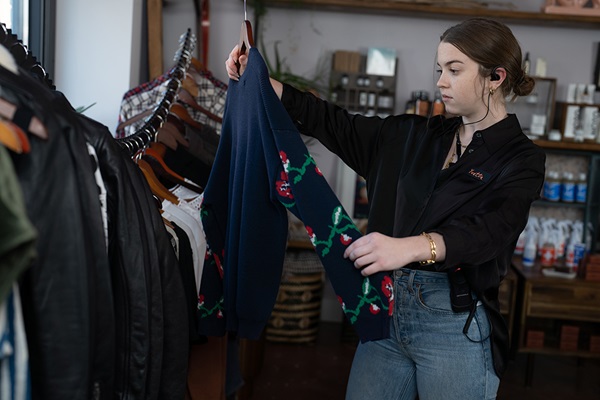Retail business owners make significant investments to keep their retail store secure and successful. Yet, even the most diligent stores can be compromised by retail loss. And these issues chip away at your bottom line.
Despite these challenges, there is good news: you can take control. This guide is designed to provide you with actionable loss prevention strategies that can help secure your inventory and safeguard your profits.
What is Loss Prevention in retail?
Loss prevention is strategies and tactics used to reduce an overall loss of products and services. As loss is on the rise, it is important for retailers to take steps to preserve profit and deter preventable loss, also known as shrinkage. Even small losses can add up over time and create major losses for a single store.
What causes shrinkage in retail?
Retail shrinkage occurs when a company loses inventory from causes other than sales. Retailers can be victims of shrinkage because of:
- Shoplifting: Shoplifting contributes significantly to retail shrinkage, accounting for around 36% of total losses experienced by retail businesses. Shoplifting involves customers unlawfully taking merchandise without payment, using techniques like concealing items, using distractions, and tampering with packaging.
- Employee theft: Employee theft is the second highest contributor to shrinkage, clocking in at 29% of all loss for retail stores.
- Administrative errors: Administrative errors, including process and control errors, account for approximately 27% of all retail shrinkage. Unlike the first two which typically occur in-store, administrative errors can occur as early as in the warehouse and have a significant impact on inventory loss.
- Operational loss: Operational losses can occur in day-to-day operations due to various factors. This includes instances where products break, expire, or are affected by disruptions in the supply chain.
- Vendor fraud: Vendor fraud can account to upwards of 5% of retail shrinkage. This type of fraud typically comes in two forms: check tampering and billing schemes, or theft occurring during inventory delivery to stores.
This concern is real for many, as the National Retail Federation has shown a growth in shrinkage from 1.4% of total retail sales 2021 to 1.6% 2022, amounting for a total of $112.1 billion in losses. Additionally, shrinkage is expected to continue to rise. So it is crucial retail stores take action now to prevent loss.
Strategies for Retail Loss Prevention and Minimizing Shrinkage
Deter retail theft with video security measures
Taking a proactive approach to loss prevention is crucial for retail success and preventing shrinkage. One of the most effective strategies is to deter theft before it happens. But what are the best methods to achieve this?
Visible security measures, such as security cameras, have shown to be effective deterrents against theft in retail environments. A study from 2011 on controlling retail theft with CCTV indicated that shrinkage decreased by 61% in stores equipped with security cameras compared to those without. Equipping a retail location with visible cameras and placing signs at the entrance indicating the presence of surveillance could deter potential thieves from entering in the first place.
Additionally, many retail stores have begun to pilot body cameras worn by employees to further deter theft. According to the National Retail Federation’s 2023 National Retail Security Survey, 35% of U.S. retailers are exploring the use of body cameras for their employees. These body cameras can capture additional footage and provide a first-person viewpoint of the situation, helping to reduce the likelihood of internal theft and enhance overall security.
Ultimately, body cameras and fixed video security systems can increase visibility and accountability, making potential shoplifters think twice before attempting theft.
Maintain communication between employees
Instant communication is necessary for preventing and reporting losses. Retailers can equip employees with tools to ensure that employees are not only connected with each other but also with their managers. This way, in the case of theft occurring or reporting it after, they have a direct connection to react accordingly.
Using communication tools such as two-way radios can allow employees to instantly notify other staff if they suspect a theft has or might occur. Having this connection can allow employees to keep management informed and in the loop as a situation progresses.
Should a theft situation escalate, it’s important for employees to have a quick way to call for assistance. Equipping staff with radios allows for immediate communication with backup or on-site security, helping to prevent theft from escalating and ensuring employee safety.
Document and collect evidence of incidents
If a loss of inventory occurs, it is important to have thorough documentation. Footage collected from fixed video surveillance or body cameras can provide evidence that can help in accurately reporting an incident as well as understanding any patterns of theft.
Capturing images of individuals allows retailers to identify potential thieves and inform employees to remain vigilant if they return in the future. Analyzing this footage can also help with training for employees to learn how to manage situations and also identify vulnerable areas of the store that may need more coverage to prevent further incidents.
Additionally, having this documentation is especially important in the case an employee is suspected of stealing. Having clear evidence helps verify any claims and protects your business from potential disputes.
Protect your store today
With shrinkage on the rise, store owners now more than ever need to take action to protect your retail location’s associates and inventory. Implementing loss prevention solutions such as radios, body cameras, and video surveillance that meet the needs of your retail location can offer both protection and peace of mind. To learn more about our solutions and services that can work for you, or to begin building your loss prevention strategy, contact sales today.





dxh468
November 25, 2024
This is a fantastic read on how technology is transforming loss prevention in retail! The integration of advanced solutions like video and AI is truly inspiring, helping retailers enhance safety, efficiency, and overall customer experience. I also appreciate how license plate recognition solutions play a key role in enterprise physical security, providing retailers with an additional layer of protection by monitoring vehicle activity and preventing unauthorized access. Motorola Solutions continues to lead the way in empowering retailers to safeguard their assets while delivering peace of mind to employees and customers alike. A must-read for anyone in the retail industry!